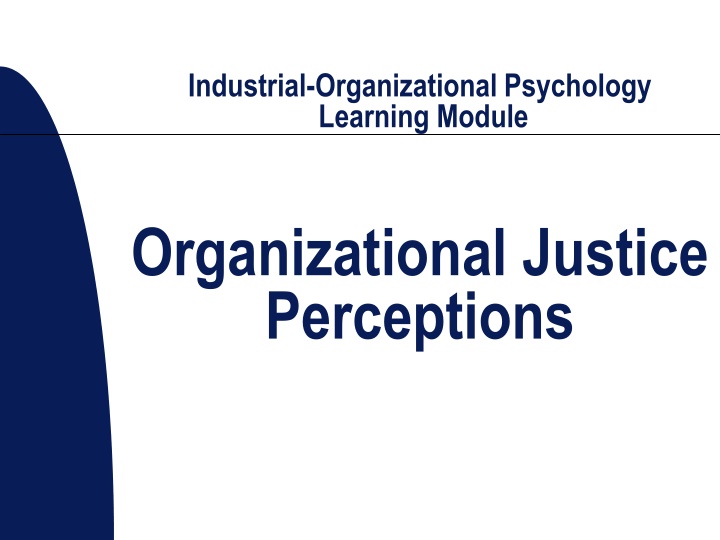
Organizational Justice Perceptions in the Workplace
Explore the concept of organizational justice perceptions, including distributive, procedural, and interactional justice. Learn about the importance of managing perceptions of justice in organizations and factors influencing these perceptions. Discover how justice perceptions impact job satisfaction, organizational commitment, performance, and behaviors at work.
Download Presentation

Please find below an Image/Link to download the presentation.
The content on the website is provided AS IS for your information and personal use only. It may not be sold, licensed, or shared on other websites without obtaining consent from the author. If you encounter any issues during the download, it is possible that the publisher has removed the file from their server.
You are allowed to download the files provided on this website for personal or commercial use, subject to the condition that they are used lawfully. All files are the property of their respective owners.
The content on the website is provided AS IS for your information and personal use only. It may not be sold, licensed, or shared on other websites without obtaining consent from the author.
E N D
Presentation Transcript
Industrial-Organizational Psychology Learning Module Organizational Justice Perceptions
Think of a time youve been unfairly treated at work Were you ever treated rudely or disrespectfully? Were you up for a promotion / raise / job, and didn t get it when you thought you should have? Why was it unfair? How did you know? How did you react? Did you take action? Why or why not?
Lesson Objectives At the end of this lesson, you should be able to: State why managing perceptions of justice is important to organizations Distinguish between three different elements of justice perceptions List factors that influence perceptions of justice
Justice Perceptions are important Justice Perceptions: employee judgments about whether their work situation is fair Justice Perceptions in organizations have been found to be related to: Job Satisfaction Organizational Commitment Job Performance Withdrawal Behaviors Counterproductive behaviors Self-perceptions
Types of Justice Perceptions Distributive Justice: perceptions of the fairness of a particular outcome Procedural Justice: perceptions of whether the process used to make the decision was fair Interactional Justice: perceptions of whether organizational agents implement procedures fairly, by treating people respectfully and explaining decisions adequately
Distributive Justice Rules for allocating resources Equity resources are distributed to employees with respect to their abilities or contributions Equality resources are distributed so each person gets the same outcome, regardless of their contributions Need resources are distributed to the person who needs them more
Distributive Justice: Equity Theory Employees compute a ratio of how much they contribute to the organization and how much they get back from the company Employees choose a coworker and computes their ratio Employees then compare ratios, and react on the basis of this comparison. Unbalanced ratios create equity distress, which lead to a variety of responses including changes in work effort or quality
Procedural Justice What are some things that lead to a procedure being seen as fair? Voice getting a say in things Consistency Bias Suppression Accuracy Correctability Ethicality
When is Procedural Justice Most Important? Favorable High Procedural Justice Reactions to Org. Low Procedural Justice Unfavorable Low High Outcome Favorability
Interactional Justice Interpersonal component treating people with dignity and respect; refraining from improper remarks or comments Informational component providing adequate explanations for decisions
Research Example (Greenberg, 1990) Two plants in the same company announced 15% pay cuts for their workers One plant given extensive explanations & remorse was shown in the announcement Second plant given a short explanation, but without remorse or apology Measured missing inventory theft Theft increased in both plants, but more so in the second plant (inadequate explanation)
Improving Fairness Perceptions Change how fair the situation actually is Improve distributive justice Improve procedural justice Treat employees with sincerity and respect Change how fair the situation is perceived How do you explain decisions and procedures to employees so they understand?
Summary Employee perceptions of justice can impact important organizational outcomes, as well as employee feelings and attitudes Types of justice include Distributive, Procedural, and Interactional Justice perceptions can be altered by actually changing the justice of a situation, or by providing adequate explanations for organizational events
